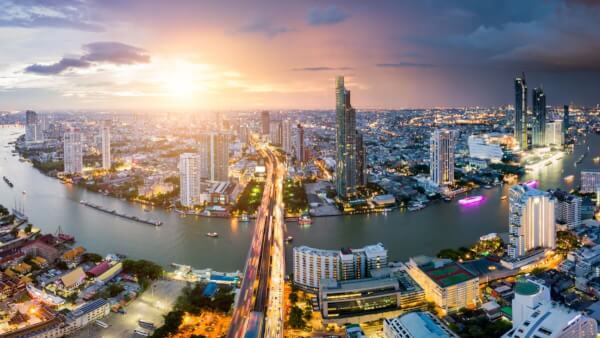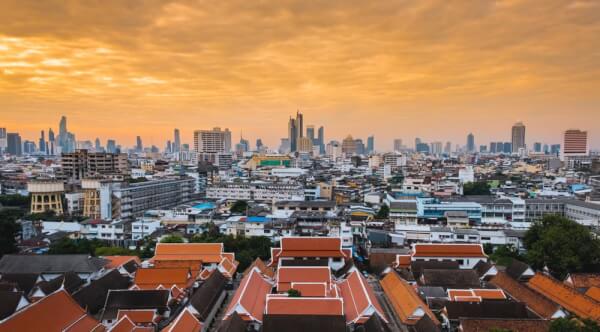A list of the top banks in Thailand
A list of the top banks in Thailand, including Bangkok Bank, Kasikorn Bank, Krungthai bank, Siam Commercial Bank and Krungsri Bank.

Thinking about upping sticks to this vibrant Southeast Asian country? Before you move over from the UK, it’s important to consider the many pros and cons of living in Thailand. In this guide, we’ll explore the main pulls and drawbacks of this country for UK nationals, so you can decide if moving to Thailand is right for you. We’ll also cover some quick facts about Thailand and recommend some of the best places in Thailand to live as an expat. Let’s get stuck in!
Also, when travelling or moving to Thailand, you may want an easy way to manage your money in Thai bahts. Check out the Wise account from the money services provider Wise. It’s not a bank account but offers some similar features, and your money is safeguarded.
Over 12.8 million people worldwide use Wise to send, spend and convert money in 40+ currencies – for low, transparent fees* and no-markup exchange rates close to what you can see on Google.
Learn more about the Wise account ➡️
Weighing up the pros and cons of moving to Thailand from the UK? Let’s start with a quick overview.
| Pros | Cons |
|---|---|
| Affordable cost of living | Cultural and language differences |
| Large expat community | Complicated visa system |
| Friendly locals | Weather extremes |
| Built for digital nomads | Poor air quality |
| Jumping off point for travelling | Potential for expensive accommodation |
| Spectacular natural scenery | Traffic congestion |
There are many reasons why Thailand has become such a popular place for British expats to call home. You can find the main ones below:
Thailand’s affordable cost of living is a big advantage for UK expats. Especially if you want to grow your savings while you’re abroad. It’s possible to travel around the country without draining your bank account (whether that’s island hopping or exploring nearby cities) and accommodation costs are significantly cheaper than back home.
In Thailand, eating out is the norm. Expats can tuck into delicious local Thai cuisine for the equivalent of just a few British pounds. You can also find some of the most authentic street food in the country – heads up, not all vendors take card payments in Thailand.
| 💡 Read more: Best ways to spend money while travelling abroad |
|---|
There’s a reason Thailand is known as the “Land of Smiles” – the locals are some of the friendliest on the planet. Whether it’s helping you with directions, shopping at a local market or learning the local etiquette, the friendliness of the Thai locals makes it easy to quickly feel at home.
Even though language barriers still exist in the country, the willingness of the locals to help out often bridges these gaps. That being said, expats should take care in tourist hotspots, where the minority of locals might offer ‘VIP services’ to English speakers as a way of paying for something you don’t need.
For digital nomads, Thailand is a prime location. Big cities like Bangkok and Chiang Mai are home to many affordable co-working spaces with lightning-fast internet speeds. Given the popularity of remote working in the country, these spaces also have comfy desk set-ups and a friendly community atmosphere.
But you don’t have to stay in the city to freelance. The Thai islands of Koh Lanta and Koh Phangan are also known for having budget-friendly coworking spaces complete with fast internet and fully-stocked workstations. Thanks to Thailand’s digital nomad visa, UK expats can work remotely in the country for up to 6 months at a time, with the option to extend the visa for up to five years.¹
| 💡 Read more: Can you keep your UK bank account when moving abroad? |
|---|
Thanks to the big expat community in Thailand, moving to the country from the UK can often feel like a ‘home from home.’ In fact, in 2024 Thailand was ranked the 6th best country in the world for expats.² Bangkok, Phuket, Chiang Mai and Chiang Rai are especially popular with foreign nationals. You can find our recommendations for the best places to live in Thailand later in the article.
This large expat community is a big advantage of Thailand, especially for newcomers to the country. Seasoned expats can advise on everything from opening a bank account in Thailand to finding the best local eats.
You can also check out non-bank alternatives, like the Wise account, to manage your money in Thailand.
For expats keen to explore Southeast Asia, Thailand is a great jumping-off point for travelling around the region. Affordable flights make it easy to access neighbouring countries or surrounding Thai islands, with the option to go somewhere new just for the weekend.
For those on Thailand’s digital nomad visa, the country’s central location also makes it easier to quickly leave Thailand when renewing the visa every six months.
The breathtaking natural scenery is another draw of Thailand for expats, especially those living in more urban areas of the UK. From sandy beaches and crystal-clue waters, to lush jungles and towering mountains, landscapes in the country are vibrant and varied.
Outdoor sporting enthusiasts can explore nature further by hiking through the dense Thai jungles or diving among the colourful coral reefs. Alternatively, you can soak up the sun on one of Thailand’s many golden beaches.

It’s also important to consider the cons of living in Thailand if you’re thinking about relocating, such as:
Even in Thailand’s most popular areas, not everyone speaks English. The uniqueness of the Thai language also makes it difficult for many Westerners to learn, often causing complications with utility bills and rental agreements. Online commenters also mention that some banks in Thailand are also better set up for dealing with foreign customers than others.
As well as certain language barriers, there are also cultural differences and social norms in Thailand worth being aware of. “Saving face” is considered important in the country, and expats might end up doing something offensive without realising it. Thai culture is deeply rooted in Buddhism, so foreigners also need to be respectful of it in temples and religious sites.
Thailand’s visa system can be tricky to get your head around, no matter which visa type you’re on! Rules can often be overcomplicated and subject to change at any time. Expats need to keep up with the current regulations of their visa so as not to be caught out.
Having to leave the country after a set period to renew your visa can also be a nuisance, particularly if you have work to do. There are also specific rules for taking cash in and out of Thailand to be aware of on your return.
For most UK nationals, the hot weather of Thailand is much welcomed. However, extreme weather patterns mean that this warmer climate isn’t always as good as it’s cracked up to be. It can be hot, humid and (very) sweaty in Thailand, making it uncomfortable to go about your day.
On the flip side, the rainy season in Thailand brings unpredictable weather and lots of rainfall. Sudden downpours can quickly flood streets and thunderstorms are also common in this period. Rain can also bring more humidity – and of course, mosquitoes.
The air quality in certain parts of Thailand is poor, with Bangkok recently voted the fourth most polluted city in the world.³ For anyone with asthma or other breathing difficulties, smoked-filled air in the larger Thai cities might make it difficult to spend time outdoors.
The traffic congestion in Bangkok and other urban areas can also cause smog in the cities, which can be a drawback for health-conscious expats. Thai islands with less traffic and a smaller population are a good alternative.
Accommodation in Thailand is generally affordable, with rent on average 60% cheaper than in the UK.⁴ However, landlords might often charge a higher price for English-speaking tenants, assuming they won’t be able to negotiate a lower cost.
This means that accommodation in Thailand can often be expensive for expats. If you can, ask a Thai speaker to negotiate a rental agreement on your behalf so you don’t end up paying more than you should.
Thailand is notorious for severe traffic congestion, with congestion in major Thai cities leading to constant traffic jams and slow movement throughout. A lack of public transport in Thailand means many people rely on private vehicles, adding to the problem of congestion.
Road safety standards in the country are also an issue and Thailand has one of the highest road traffic fatality rates in Asia.⁵ Expats need to be hyperaware when crossing the street in all parts of the country.
Get a flavour of what life is like in Thailand with these quick facts.
| 💰 Currency | Thai Baht (THB) |
|---|---|
| 👥 Population⁶ | 71.6 million |
| 🗣️ Language(s) | Thai, English, Lao, Chinese, Burmese and Malay. |
| 📊 Number of foreign nationals⁷ | 2.5 million |
| 🇬🇧 Number of British expats⁷ | 41,000 |
| ☁️ Weather | Tropical climate with three distinct seasons: a wet season, a cool season and a hot, dry season. |
The best place to live in Thailand depends largely on what you’re looking for. For example, Thai cities like Bangkok, Chiang Mai, Phuket and Chiang Rai have a large international community which makes it easy to meet other expats. For a more beachy lifestyle, the lively seaside town of Hua Hin or Koh Samui island on the Gulf of Thailand are great options.
For single expats, busier cities like Phuket Town and Bangkok have a vibrant nightlife and offer a diverse lifestyle. Affordable cities like Chiang Rai, Chiang Mai, Ayutthaya, Korat and Udon Thani are great for the budget-conscious expat.
Thailand is generally considered one of the safest countries in Southeast Asia, with crime rates low and people feeling safe walking alone both day and night.⁸ However, the country has a fair amount of scams that specifically target tourists and pickpockets often operate in busy tourist areas like Khao San Road in Bangkok, Patong Beach in Phuket and Walking Street in Pattaya.
Sources used:
Sources last checked on date: 26-March-2025
*Please see terms of use and product availability for your region or visit Wise fees and pricing for the most up to date pricing and fee information.
This publication is provided for general information purposes and does not constitute legal, tax or other professional advice from Wise Payments Limited or its subsidiaries and its affiliates, and it is not intended as a substitute for obtaining advice from a financial advisor or any other professional.
We make no representations, warranties or guarantees, whether expressed or implied, that the content in the publication is accurate, complete or up to date.

A list of the top banks in Thailand, including Bangkok Bank, Kasikorn Bank, Krungthai bank, Siam Commercial Bank and Krungsri Bank.

Everything you need to know about moving to Thailand from the UK. Read about visas, popular expat destinations, healthcare and more.

Everything you need to know about retiring in Thailand from the UK, including visas, popular cities for UK expats, healthcare and much more.

A guide to Thai retirement visas for UK nationals and residents: what visas are available, the requirements and how to apply.

For many westerners, holidays in Thailand can be difficult to keep track of, since many of them change dates yearly depending on the lunar calendar....

With its white sandy beaches and warm weather every day, Thailand embodies a tropical paradise. It’s a popular destination for tourists and expats looking for...